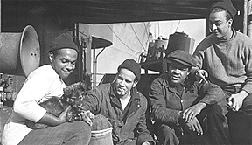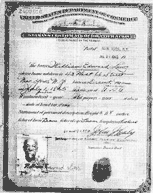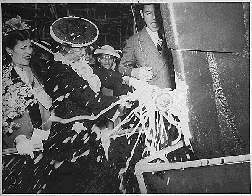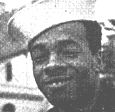African-Americans in the U.S. Merchant Marine and U.S. Maritime Service
The SS Booker T. Washington
Of the approximately 2,700 Liberty Ships, 17 were named for outstanding African-Americans. The first, in honor of Booker T. Washington, was christened by Marian Anderson in 1942. Captain Hugh Mulzac, an African-American, served as master of the ship for four years, delivering troops and supplies to the war zones. Adrian T. Richardson, John Godfrey, and Clifton Lastic also captained mixed-race crews during WWII.
Captain Hugh Mulzac
In 1942, against overwhelming odds, Captain Hugh Mulzac became the first African-American merchant marine naval officer to command an integrated crew during World War II. Born March 26, 1886 on Union Island, St. Vincent Island Group, British West Indies, Mulzac entered the Swansea Nautical College in South Wales to prepare for a seaman's career while in his youth. He became an American citizen in 1918, and continued his training at the Shipping Board in New York. He earned his captain's rating in the merchant marine in 1918, but racial prejudice denied him the right to command a ship.Later Mulzac was offered the command of a ship with an all-black crew. He refused, declaring that "under no circumstances will I command a Jim Crow vessel." Twenty-two years passed before Mulzac would again receive an offer to command a naval ship. During World War II, his demand for an integrated crew was finally met, and he was put in command of the SS Booker T. Washington.
With its crew of eighteen nationalities, the Booker T. Washington made twenty-two round-trip voyages in five years and carried 18,000 troops to Europe and the Pacific. On the day his ship was launched, Mulzac recalled, "Everything I ever was, stood for, fought for, dreamed of, came into focus that day... The concrete evidence of the achievement gives one's strivings legitimacy, proves that the ambitions were valid, the struggle worthwhile. Being prevented for those twenty-four years from doing the work for which I was trained had robbed life of its most essential meaning. Now at last I could use my training and capabilities fully. It was like being born anew."
[Portrait of Captain Hugh Mulzac by Betsy Graves Reyneau, Oil on canvas, c.1946 National Portrait Gallery, Smithsonian Institution]
Crew of SS Booker T. Washington with mascot "Booker"
[photo from National Archives]The Booker T. Washington was turned back over to the Maritime Commission in 1947. Despite his many years of service, Mulzac was never again given a similar assignment.
Captain Mulzac was but one of the approximately 24,000 African-Americans (10 % of the Service) in the Merchant Marine during WWII.
Captain Mulzac died in 1971, at age 84 years, without achieving veteran status for service to his country. Mariners received veteran status in 1988 only after a long court battle. Struggle for Veteran Status
African-Americans served in every capacity aboard the ships, at a time when the army and navy employed policies of racial restriction and segregation. For example, at the beginning of the war, African-Americans could serve only as messmen in the Navy.
William Edward Lew was a music professor and powerful tenor who performed in the Boston area. He joined the Merchant Marine in 1943 at age 78 and served for one year as a cook.
William Lew's Seaman papers are shown above, giving his date of birth as July 1, 1865; the document is dated July 29, 1943.The U.S. Maritime Service, the official training organization of the U.S. Merchant Marine, also applied a nondiscrimination policy at a time other services were segregated.
Liberty Ships Named in Honor of African-Americans
Launching the SS Harriet Tubman 6/3/44
[Photo from National Archives]Robert S. Abbott, publisher of the newspaper The Chicago Defender.
Robert J. Banks, messman on the SS Gulfamerica which was torpedoed on April 10, 1942.
George Washington Carver, Scientist and educator at Tuskegee Institute (Tuskegee, AL).
William Cox, fireman on the SS David H. Atwater which was shelled and sunk April 2, 1942.
Frederick Douglass, a former slave, edited "The North Star," an abolitionist newspaper.
Paul Laurence Dunbar, the first African-American to gain national eminence as a poet.
John Hope, former president of Atlanta University (GA).
James Weldon Johnson, author, lyricist, and civil rights activist. First executive secretary of the National Association for the Advancement of Colored People (NAACP).
George A. Lawson, messman on the Tug Menominee which was torpedoed and sunk on March 31, 1942.
John Merrick, first president of the North Carolina Mutual Life Insurance Company, which is still operating.
John H. Murphy, publisher of theThe Afro-American Newspaper chain.
Edward A. Savoy, worked as a page to Hamilton Fish, Secretary of State. In 1869, he travelled to Paris to serve the United States Peace Commission after the Spanish-American War.
Harriett Tubman, a former slave who became an abolitionist. She served as a nurse and spy for the Union Army during the Civil War. She is known for her many successful trips on the underground railroad, asssisting African Americans in their escape from slavery.
Robert L. Vann, publisher of the Pittsburgh Courier, founded in 1910, which was the most widely-read black newspaper in the U.S. in 1940.
James K. Walker, second cook on the SS Gulfamerica which was torpedoed on April 10, 1942.
Booker T. Washington, national advisor on "Negro affairs," and founder of Normal School for Colored Teachers which became Tuskegee Institute (Tuskegee, AL).
Bert Williams, considered one of the world's finest comedians. His musical recordings were among the best selling hits of the era. He acted in Minstrel Shows, starred in the Ziegfeld Follies, and was the first black to join Actor's Equity.
Ship Construction
Many members of the construction crews of Liberty Ships were African-Americans who were permitted mainstream industrial jobs for the first time. Black women significantly contributed to the construction effort. At the Kaiser Richmond, California Shipyard, 1,000 women were among the 6,000 African-American workers. The women performed the same tasks as the men.Profiles of African-Americans in the Merchant Marine
(from MAST Magazine 1944)






